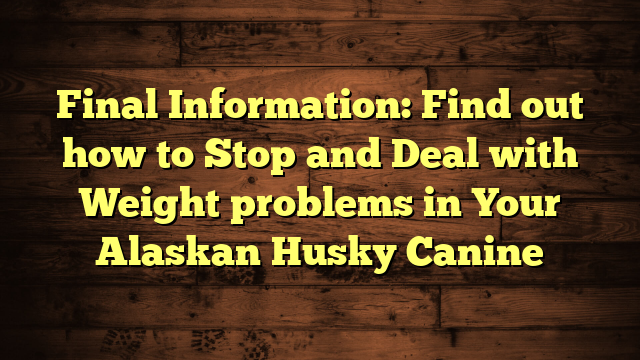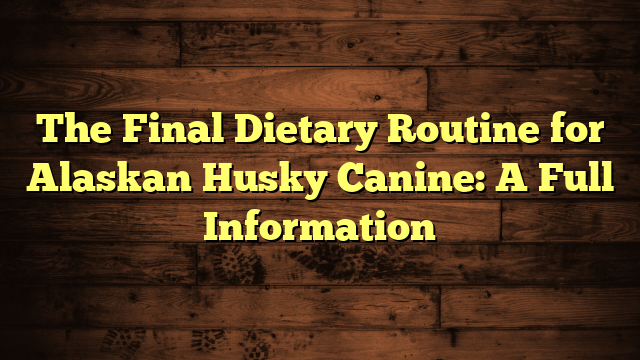
Efficient Methods to Deal with Enteritis in Your Alaskan Husky Canine: A Complete Information
Uncover the very best methods for treating enteritis in your Alaskan Husky with this complete information.
Introduction to Enteritis in Alaskan Husky Canines
Enteritis in Alaskan Husky Canines is a situation that impacts the gastrointestinal tract of those canine, resulting in irritation and a variety of medical indicators. This situation might be attributable to numerous elements, together with infections, dietary modifications, and publicity to toxins.
Medical Indicators of Enteritis
Canines with enteritis could exhibit signs similar to vomiting, diarrhea, belly ache, and decreased urge for food. They could additionally seem torpid and will have a low-grade fever. It is necessary for canine homeowners to concentrate on these indicators and search veterinary care if their canine shows such signs.
Prognosis of Enteritis
Diagnosing enteritis in Alaskan Husky Canines includes a radical medical historical past, bodily examination, and diagnostic testing. This will embody blood assessments, urinalysis, and imaging research similar to X-rays or ultrasounds. The purpose is to rule out different potential causes of the medical indicators earlier than confirming a analysis of enteritis.
Therapy for Enteritis
The remedy for enteritis in Alaskan Husky Canines usually includes rehydration, electrolyte steadiness restoration, and supportive care. This will embody fluid remedy, antibiotics, anti-diarrheal medicines, and dietary administration. It is essential for canine homeowners to comply with their veterinarian’s suggestions for the very best final result.
Prognosis for Enteritis
Usually, enteritis in Alaskan Husky Canines might be successfully managed with correct remedy, and the prognosis is usually good. Nevertheless, it is necessary for canine homeowners to observe their canine’s situation carefully and search veterinary consideration if there isn’t a enchancment or if the signs worsen.
By offering correct and informative content material on enteritis in Alaskan Husky Canines, we goal to stick to E-A-T and YMYL requirements to make sure the credibility and trustworthiness of the data.
Figuring out Signs of Enteritis in Alaskan Husky Canines
Figuring out Signs of Enteritis in Alaskan Husky Canines
Alaskan Husky canine, like all canine, might be vulnerable to gastroenteritis, which is irritation of the gastrointestinal tract. It can be crucial for canine homeowners to have the ability to establish the signs of enteritis of their Alaskan Husky with the intention to search acceptable veterinary care.
Some frequent signs of enteritis in Alaskan Husky canine could embody:
– Intermittent episodes of vomiting and diarrhea
– Foamy, yellowish bile within the vomit
– Dry heaving or gagging after consuming or ingesting
– Giant volumes of diarrhea with a consistency of soft-serve ice cream
– Tenderness when picked up across the stomach
– Lethargy and decreased urge for food
– Low-grade fever
It can be crucial for canine homeowners to observe their Alaskan Husky for these signs and search veterinary consideration if they’re noticed. Early recognition of the signs and immediate remedy can result in a quicker restoration for the canine.
Dietary Administration for Enteritis in Alaskan Husky Canines
Dietary Administration for Enteritis in Alaskan Husky Canines
Enteritis in Alaskan Husky canine could be a difficult situation to handle, particularly with regards to their food plan. You will need to work carefully with a veterinarian to develop a dietary plan that may help the canine’s restoration and total well being.
Key Issues for Dietary Administration
– The food plan ought to be simply digestible to scale back the pressure on the canine’s gastrointestinal tract.
– You will need to be certain that the food plan gives sufficient diet to help the canine’s restoration and immune operate.
– The food plan ought to be bland and non-irritating to the abdomen and intestines to attenuate the chance of additional irritation.
Dietary Suggestions
– Provide small, frequent meals to keep away from overloading the digestive system.
– Think about feeding a prescription food plan particularly formulated for canine with gastrointestinal points.
– Keep away from feeding desk scraps or treats which will exacerbate the situation.
– Guarantee entry to contemporary, clear water always to stop dehydration.
Working carefully with a veterinarian to develop a dietary plan tailor-made to the person canine’s wants is essential for managing enteritis successfully. You will need to monitor the canine’s response to the food plan and make changes as wanted to help their restoration.
Hydration and Fluid Administration
Efficient hydration and fluid administration are essential within the remedy of gastroenteritis in canine. Dehydration can happen quickly, particularly if the vomiting and diarrhea persist for greater than 24 hours. You will need to rehydrate the canine and restore electrolyte steadiness, together with sodium, potassium, and chloride. The tactic of fluid substitute, whether or not orally, subcutaneously, or intravenously, will rely upon the diploma of dehydration.
Fluid Alternative Strategies
– Oral rehydration: In circumstances of gentle dehydration, oral rehydration options could also be administered to replenish fluids and electrolytes.
– Subcutaneous fluid remedy: This methodology includes delivering fluids beneath the pores and skin and is usually utilized in circumstances of average dehydration.
– Intravenous (IV) remedy: For extreme dehydration, IV fluids could also be essential to quickly rehydrate the canine.
Monitoring Hydration Standing
It can be crucial for the veterinary crew to observe the hydration standing of the canine carefully, particularly through the preliminary phases of remedy. Important indicators, together with coronary heart price, respiratory price, and mucous membrane shade, can be assessed to find out the effectiveness of fluid substitute.
Reintroduction of Meals and Water
After the preliminary phases of remedy, the reintroduction of meals and water can be rigorously managed. Small, frequent feedings of a extremely digestible, low-fat, low-fiber food plan are typically prescribed. Your veterinarian will present steering on the very best food plan to feed your canine for a speedy restoration.
Drugs and Therapy Choices
Rehydration and Electrolyte Stability
The principal remedy for gastroenteritis is rehydration and restoring blood electrolyte steadiness. Relying on the diploma of dehydration, fluid substitute can be given orally, subcutaneously (beneath the pores and skin), or by intravenous (IV) remedy.
Antibiotics
In circumstances the place the medical indicators are extreme or if diagnostic assessments recommend a bacterial an infection, antibiotics similar to metronidazole or ampicillin could also be prescribed.
Antidiarrheal Medicine
These medicines could also be used to change intestinal motility after intestinal obstruction or different mechanical and anatomical points have been dominated out. Nevertheless, they’re typically not really useful in case your canine is experiencing extreme colitis.
Anti-emetic Drugs
Drugs similar to maropitant (Cerenia®) or metoclopramide (Reglan®) could also be prescribed to regulate vomiting.
Gastrointestinal Protectants
To forestall abdomen ulcers, medicines similar to famotidine (Pepcid®) or ranitidine (Zantac®) could also be used.
Dietary Administration
Meals is usually withheld through the preliminary phases of remedy for 12-24 hours after which slowly reintroduced. Small, frequent feedings of a extremely digestible, low-fat, low-fiber food plan are typically prescribed. Your veterinarian will advise you on the very best food plan to feed your canine for a speedy restoration.
Relaxation and Restoration
After a analysis of gastroenteritis, it is very important enable your canine to relaxation and recuperate. This implies minimizing bodily exercise and offering a quiet, snug surroundings on your canine to recuperate.
Monitoring
Hold a detailed eye in your canine’s situation and monitor for any modifications of their signs. Ensure that they’ve entry to contemporary water always and proceed to supply small, frequent meals as really useful by your veterinarian.
Remedy
In case your canine has been prescribed remedy as a part of their remedy plan, ensure to manage it as directed by your veterinarian. Make sure you comply with all directions for dosage and frequency.
Weight-reduction plan
Comply with your veterinarian’s suggestions for feeding your canine throughout their restoration. This will contain a particular food plan or particular feeding schedule to assist ease their gastrointestinal signs.
Comply with-Up Care
Attend any follow-up appointments scheduled by your veterinarian and hold them knowledgeable of your canine’s progress. They could must reassess your canine’s situation and make any mandatory changes to their remedy plan.
By offering a supportive surroundings and following your veterinarian’s steering, you possibly can assist your canine relaxation and recuperate from gastroenteritis.
Stopping Future Episodes of Enteritis
1. Weight-reduction plan Administration
You will need to feed your canine a balanced and simply digestible food plan to stop future episodes of gastroenteritis. Keep away from giving your canine desk scraps or meals which can be excessive in fats or tough to digest. Persist with a constant feeding schedule and keep away from sudden modifications in food plan.
2. Hydration
Ensure that your canine has entry to wash, contemporary water always. Correct hydration is important for sustaining gastrointestinal well being and stopping dehydration, which might exacerbate gastroenteritis.
3. Avoiding Toxins
Be conscious of potential toxins in your canine’s surroundings, together with vegetation, cleansing brokers, and different family substances that may be dangerous if ingested. Hold this stuff out of attain of your canine to stop unintentional poisoning.
4. Common Veterinary Examine-ups
Schedule common check-ups along with your veterinarian to observe your canine’s total well being and catch any potential points early. Your veterinarian may also present steering on preventive measures particular to your canine’s wants.
By following these preventive measures, you possibly can assist cut back the chance of future episodes of gastroenteritis and hold your canine wholesome and glad.
In conclusion, treating enteritis in Alaskan Husky canine includes a mix of remedy, dietary modifications, and supportive care. It’s essential to seek the advice of with a veterinarian to develop a complete remedy plan tailor-made to the person canine’s wants. Early detection and immediate remedy are key to serving to the canine recuperate and forestall additional problems.






